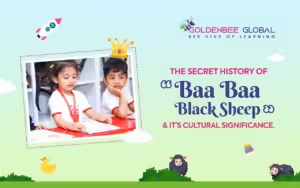
Have you ever casually hummed the children’s rhyme “Baa Baa Black Sheep” when dressed or standing in line? Beyond simple kid sing-alongs, this song has rich cultural importance and history. Grab your seatbelts, because we’re going to unveil the captivating story of this woolly marvel!
Deeper Than a Sheep Dip
Despite what many people think, “Baa Baa Black Sheep” is about more than merely an inhabitant of the barnyard who barters. Historians state that the rhyme first appeared in England in the Middle Ages when you think of knights, jousting, and all that jazz. Wool was a vital source of income for the nation back then. Kings imposed taxes in the form of wool, a practice that the rhyme brilliantly masks as being “three bags full.”
The Mystery of the Black Sheep
“A Story of Oppression and Resistance”
“Black sheep” refers to more than just the fleece’s hue. “Black” used to be an expression used frequently for evil or unlucky things. Therefore, the black sheep might stand in for a poor farmer who struggled to pay the wool tax or a rebel who opposed the king’s authority. The king himself or a wealthy farmer may be the “master” referred to in the song!
A Song of Social Commentary?
Some academics said “Baa Baa Black Sheep” was a subtly critical social critique. Children may have unintentionally learned about the unjust structure of the wool tax system by listening to songs about the plight of the black sheep. What youngster wouldn’t, after all, have empathy for a sheep who receives nothing but “little boy blue”?
A Timeless Classic
Even with its enigmatic beginnings, “Baa Baa Black Sheep” is still very dear. For young children, the simple lyrics and enticing rhythm make it an excellent gateway to the world of rhyme and song. It serves as a reminder of bygone eras and the eternal value of customs.
Evolution of a Rhyme
Over the decades, “Baa Baa Black Sheep” has experienced multiple changes. The melody that we are familiar with today is a comparatively new creation. Previous iterations had more intricate melodies and even extra lines referring to the black sheep being sent “overseas.” This may allude to the thriving wool commerce between England and other European nations.
Beyond the Farmyard
The farmyard is not the sole location where “Baa Baa Black Sheep” has an impact. Literature and popular culture have both made references to the rhyme. This is evidence of storytelling’s universality and the fact that even songs that seem straightforward might have deeper meanings that simply have yet to be explored.
Thus, the next time you catch yourself humming this renowned song, remember that you are singing far beyond a nursery rhyme. You’re taking part in a centuries-old custom that discusses issues of economic inequality, social justice, and the resilient spirit of the outcast.
“Goldenbee Global: Enriching Young Minds with Cultural Narratives”
The best international school in Bangalore, Goldenbee Global, understands how important it is to expose kids to various cultural experiences. Investigating the untold tales behind well-known rhymes helps to pique people’s interest, foster critical thinking, and develop a broader understanding of the world.







